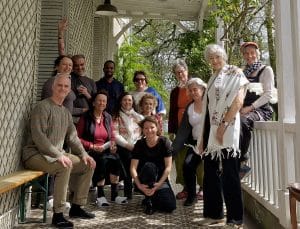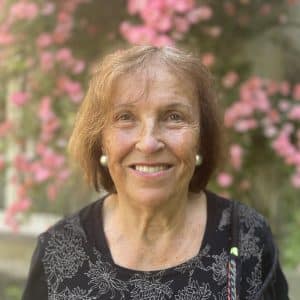Hello Yeshe. I wanted to take this time with you to discuss Dechen Chöling and your relationship to it. You first came as a director but also now as a teacher in residence and basically your memories about Dechen Chöling and how it feels to be here ?
Good question, I have to think about it, in the heat ! (That day we had a very strong heat wave hitting the Limousin.)
My memories are, right now I’m here but when I’m not here, my memories are : this beautiful place with all these rolling hills and the brown cows and the trees moving in the wind and people coming together to practice, to find out what’s cooking in our mind, usually a lot.
We try to remember shamatha-vipashyana, not just shamatha, so still-abiding and clear-seeing.
When we are busy in our lives we forget the clear-seeing because we’re, kind of hunting, after our projections. When I walk in town I can have comments about whatever or whoever walks by : this looks stupid, that’s a nice dress, this could do this, this could do that, etc…
The main thing is to come back to the moment and that’s what we’re trying here. That’s also very challenging because you get all kinds of people here, once you know a long time and we all know our habitual patterns and our styles, good bad and blah blah blah, and to always come back to that moment and appreciate the quality of basic goodness.
Well I couldn’t even imagine a life without sangha and people who are willing to work with their mind and their being and are willing to open up their hearts and have a sense of humor about their own thingies and other people’s thingies.
Yeshe’s time as Director of Dechen Chöling
I came here a long time ago, I think in 1998 until 2003. Catherine (Éveillard) was the director before me and I had a lot of good friends who took different roles and we tried our best to invite other people and we had the great luck also to have Khenpo Tsültrim Gyatso Rinpoche coming and his students from Europe joining us.
Sometimes we were 150 people or something. We had big programs with the Sakyong and the festival and so there were dathüns with 80 people and Kyudo going on at the same time.
It was beautiful. You walked up the alley and you see the Kyudo-ka shooting on the platform in their white shirts and their black pants and silently. It’s so memorable and it will happen this year again.
And I really hope that Dechen Chöling can attract a lot of new people, young people and create programmes that are interesting and we all need in our lives.
How do you see your role here as a teacher-in-residence?
I see it more as just an example. I sit every time when there’s practice, I sit in the shrine room.
Not as umdze because I also want other people to experience it. (The umdze is the time keeper next to the shrine and leading the chants)
Then, we have a book club, certain evenings we study some texts together and talk about our personal experience. That is extremely valuable. There’s no “grand knowledge”. We all have our own experiences.
We have social evenings and then when there’s a program we have talks from the visiting teachers like tomorrow the Eco-Dharma is starting and we can go to the first and the last talk so that people who come here as MIAs (Meditation-In-Action), that they benefit from the time being here, a combination of practice, community, being helpful and enjoying wonderful meals and take walks and spend time together, make friends.
I hope the invitation to come as MIA reaches also people who are not in the sangha, because you can come here, be welcomed and help.
So, my role is to build a frame. Talk to people, hold personal interviews and just provide a continual, continuous communication.
What would you say to someone who’s never been to Dechen Chöling and doesn’t yet see what it could bring to their heart, their path, their life?
If you’re in the city center, you work and go in the evening or once in a while you have a weekend.
But here you’re actually here for one week, 10 days, one month for the dathün and you have the nature, the beauty of Dechen Chöling. That is just heartbreaking I think. The flowers and the trees, the old trees and the wind moving the leaves and the sound and then all these birds.
And I think it’s a different experience than being in the city. It’s very, very valuable to have that kind of experience, to get out and be away from your place where you live and your friends and be in a new situation and experience your own being. A big deal.
Your own mind and your own wisdom at the same time. Confusion. And both are supposed to be just fine if you’re willing to look at it. Usually we think we shouldn’t be confused and it should be wonderful all the time and life should work out but it doesn’t.
It’s not wonderful all the time and to work just with that, that’s what we learn too.
Here in Dechen Chöling, it’s 24 hours a day.
Wash dishes, clean the toilets, sit in the shrine room, listen to people in the dining room, talk, talk, talk, talk, talk. That’s why I also love silent routines sometimes and take little walks. And be there.
Is there something you would like to add about what practice means to you, to your life?
I guess right now I mostly just do Shamatha-Vipassana, Tara practice, and a few simple practices.
I did all this other stuff and it’s wonderful. But right now I feel more simple and it means a lot.
It means trying to come to the moment, accept myself as I am, and as Trungpa Rinpoche said, the past is over, the future is a dream. We are walking on the edge of a razor blade.
So it’s remembering, be here now.
Over the years and that’s maybe close to 50, it definitely changed my way of thinking and hopefully behaving. And all I wanted to do is be helpful whatever way.
Thank you Yeshe. You’re welcome.
❤️☀️❤️☀️❤️☀️❤️☀️

If you want to learn how you can come as M.I.A. Meditation-In-Action,
CLICK on the link down below.
Join us by rolling up your sleeves to reveal the full beauty of Dechen Chöling.
Our team here at Dechen Chöling is very small. The MIAs—Meditation in Action volunteers who come and go throughout the year. Whether you can stay for a whole week or just one or two days, your presence and support are deeply appreciated.
There will be time for morning and evening meditation, time to work and make Dechen Chöling welcoming, and also time to relax, recharge, and enjoy being together.
Come join us—and let’s co-create the awakened society the world so deeply longs for.

